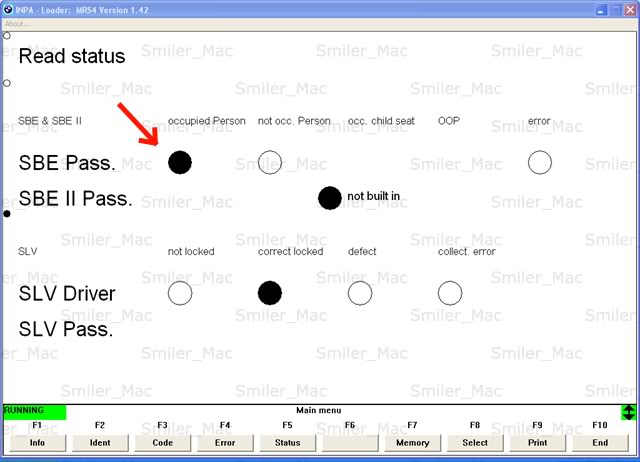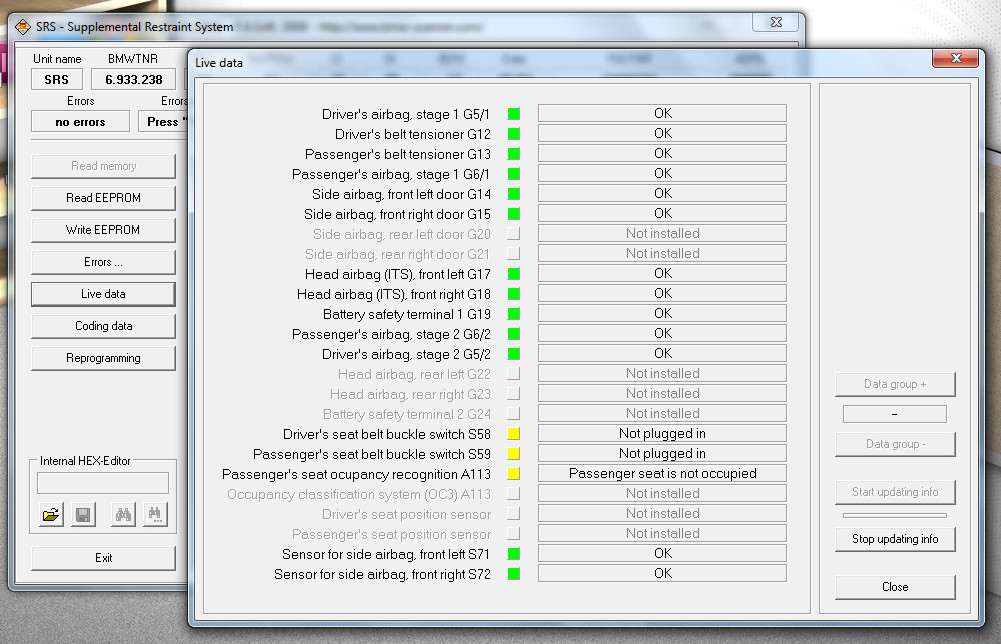READ THIS FIRST!
Auto Power assumes no responsibility for errors that may occur when tinkering tip used. It is entirely the user's own risk and it is done entirely at your own risk.
One feature I have is stubbornness, because I have never given up the idea of simuutf8g the sensor mat that sits in the passenger seat to activate the airbag when someone sits in the chair. This indication carpet caused several E39 owners concern and often a rather large cost for replacement of the same.
My passenger seat is barely used and still complicate this carpet, it feels wrong to replace it with an identical one that can break after six months. Sensor mat is simply mounted in besparningssyfte, to save a airbagreperation unnecessarily at a collision, a cost of about 3-4000 SEK according to the information I received. To then choose such a design that ultimately cost the car owner money in repairs to have a working security system in his car appears to be a structural failure is my opinion. Since I have not worked purely practical with electronics since ≠ 98 with debugging, testing, design of control systems for electric locomotives so I felt a bit rusty when soon forget the most elementary, but some ideas I had.
But with Folkes and George "ariston" to bounce ideas and knowledge with, we have come to the conclusion that, with limited resources is to replace the carpet and still get the right indication to the airbag system to trigger but with the feature that triggers even if there is someone in the seat.
I want to point out that neither I nor Autopower take any responsibility for this simulation, but it is everyone's responsibility if you are doing this on their car. As long as you have an electronic module under the seat with the number 65778367242 as it should work and this number is up to 09/2003.
On the E46, so usually the module sitting in the middle of the seat.
A new sensor mat was purchased to qualify the reference to measure and try to find out how it was constructed.
Picture 1.
A restorer with SRS airbag reset was needed, too, purchased from the U.S., to avoid having to go to Car & Electricity in Orebro each time the airbag light came on. And I borrowed some needed equipment from my job.
Picture 2.
How does the sensor mat, well the expression "as kapacitansresistens" arose during the process. A "tangetbordsmatta" with a parallkopplad diode in a circuit.
The diode provides a resistance when measuring with a multimeter in the leading direction, and this resistance is influenced and changed by pressing the mat's sensors. Unloaded about 130 ohms down to about 40 ohms at "full" load. This measurement is related only to the particular instrument I use.
Diode function is to notify the system that the loop does not have a break and then turns off the airbag light on the instrument.
Then you have a capacitance meter and make a measurement phase reversed the diode blocking direction, so you measure only the sensor loop and then received a value of ca.1400pf unloaded and loaded 0PF as soon as I touched the sensors are exactly the same as when measuring live in the system with osciloscope .
In the chair sits a Canbus giving pulsating voltage of about 4V through the loop, one half period runs through the diode to check that the loop is complete, the second half period by the sensors to check if someone is sitting in the seat. Since notifies that everything is OK and the airbag system's central unit and the light goes out in the instrument.
Only one LED extinguishes also airbag light, but then it is probably not the airbag activated, but this indicates that no sitting in the chair. According to BMW's documentation to make a short in the circuit that the airbag light comes on for about 2 minutes and then go off, then the sensor mat disconnected and the airbag is triggered even when there is someone in the chair, this function I have not tested it. You can also software wise to disconnect the sensor mat circuit with DIS with the same function as above. Unfortunately, it's given some restrictions with this and may only be made by the workshops at the seat switch to chairs without sensor mat. However, it gives a break or high resistance in the loop the airbag light comes on and the system is inoperative.
I have tested quite a few different variations to see how light and amplitude are affected with diodes, resistors and capacitors in various denominations to arrive at the final result. With an engaged occiloscope with 1V/linje and 2ms sweep so looking amplitudes like this at different measurements.
Picture 3. Represents a flawless sensor mat in full operation without load.
Picture 4. Here I have replaced the sensor mat
with only one diode, and one sees that it is almost exactly the same as the uncompressed mat and then probably not the airbag is activated.
Picture 5. How does it look when a sensor mat is loaded, a substantial difference.
Picture 6. Here I have replaced the carpet with a parallel diode, 100pF, capacitor and a resistor and 56kOms sweep is so identical to a loaded sensor mat so here I am satisfied with the tests and assembles this instead of the faulty mat in the car.
Picture 7.
The blue cable is the diode blocking direction side ie. where the line is, all mounted in a sugar cube
Components with Elfa part:
70-003-75
1N4002 Diode 1A 100V
60-107-06
56kOhm resistors 5% 1/4 watt
65-692-48
Capacitor ker.100pF/500V
It is up to each individual to interpret this and use this method to simulation.




















 Απάντηση με παράθεση
Απάντηση με παράθεση

 το μέλος μας
το μέλος μας 





